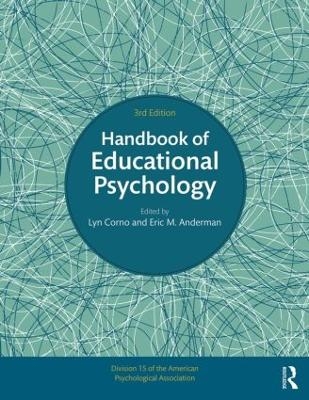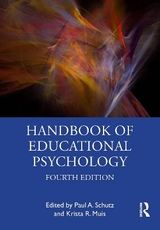
Handbook of Educational Psychology
Routledge (Verlag)
978-0-415-89482-1 (ISBN)
- Titel erscheint in neuer Auflage
- Artikel merken
The Handbook of Educational Psychology, Third Edition, provides an indispensable reference volume for scholars in education and the learning sciences, broadly conceived, as well as for teacher educators, practicing teachers, policy makers and the academic libraries serving these audiences. It is also appropriate for graduate level courses in educational psychology, human learning and motivation, the learning sciences, and psychological research methods in education and psychology.
Lyn Corno is former Professor of Education and Psychology (retired) at Teachers College, Columbia University, USA, and co-Editor of Teachers College Record and the National Society for the Study of Education Yearbooks. Eric M. Anderman is Professor of Educational Psychology and Chair of the Department of Educational Studies at The Ohio State University, USA.
Part I. Psychological Inquiry in Education. 1. Philosophical Perspectives on Mind, Nature, and Educational Psychology. Eric Bredo, University of Toronto, Canada. 2. Modes of Inquiry in Educational Psychology and Learning Sciences Research. William R. Penuel, University of Colorado at Boulder; Kenneth A. Frank, Michigan State University. 3. The Work of Educational Psychologists in a Digitally Networked World. Punya Mishra, Matthew J. Koehler, Christine Greenhow, Michigan State University. 4. The Prospects and Limitations of Latent Variable Models in Educational Psychology. Benjamin Nagengast, Ulrich Trautwein, University of Tübingen, Germany. Part II. Functional Processes for Learning. 5. Learning as Coordination: Cognitive Psychology and Education. Daniel L. Schwartz, Stanford University; Robert Goldstone, Indiana University. 6. Emotions and Emotion Regulation in Academic Settings. Monique Boekaerts, Leiden University, The Netherlands; Reinhard Pekrun, University of Munich, Germany. 7. Motivation. Lisa Linnenbrink-Garcia, Michigan State University; Erika A. Patall, University of Texas, Austin. 8. Volition. Gabriele Oettingen, New York University; Jana Schrage, University of Hamburg, Germanny; Peter M. Gollwitzer, New York University. Part III. Learner Readiness and Development. 9. Human Cognitive Abilities: Their Organization, Development, and Use. Patrick C. Kyllonen, Educational Testing Service. 10. Cognition and Cognitive Disabilities. H. Lee Swanson, University of California, Riverside. 11. Personal Capability Beliefs. Ellen L. Usher, University of Kentucky. 12. Motivation Interventions in Education: Bridging Theory, Research, and Practice. Chris S. Hulleman, University of Virginia; Kenn E. Barron, James Madison University. 13. Beyond the Shadow: The Role of Personality and Temperament in Learning. Arthur E. Poropat, Griffith University, Australia. 14. Cultural, Racial/Ethnic, and Linguistic Diversity and Identity. Na’ilah Suad Nasir, University of California, Berkeley; Stephanie J. Rowley, University of Michigan; William Perez, Claremont Graduate University. 15. Language Development. Alison L. Bailey, University of California, Los Angeles; Anna Osipova, California State University, Los Angeles; Kimberly Reynolds Kelly, California State University, Long Beach. 16. Character Education, Moral Education, and Moral-Character Education. Cary J. Roseth, Michigan State University. Part IV. Building Knowledge and Subject Matter Expertise. 17. Literacy for Schooling: Two-Tiered Scaffolding for Learning and Teaching. Ian A. G. Wilkinson, The Ohio State University; Janet S. Gaffney, University of Auckland, New Zealand. 18. Warm Change about Hot Topics: The Role of Motivation and Emotion in Attitude and Conceptual Change about Controversial Science Topics. Gale M. Sinatra, University of Southern California; Viviane Seyranian, California State Polytechnic University, Pomona. 19. Toward an Educational Psychology of Mathematics Education. John R. Star, Harvard University; Bethany Rittle-Johnson, Vanderbilt University. 20. Functional Scientific Literacy: Seeing the Science within the Words and Across the Web. Iris Tabak, Ben-Gurion University of the Negev, Israel. 21. Studying Historical Understanding. Chauncey Monte-Sano, University of Michigan; Abby Reisman, University of Pennsylvania. 22. Civic Education. Mario Carretero, Autonoma University of Madrid, Spain; Helen Haste, Harvard University; Angela Bermudez, Deusto University, Bilbao, Spain. Part V. The Learning and Task Environment. 23. Sociocultural Perspectives on Literacy and Learning. David O’Brien, University of Minnesota; Theresa Rogers, University of British Columbia, Canada. 24. Learning Environments In and Out of School. Brigid Barron, Stanford University; Philip Bell, University of Washington. 25. Networked Learning. Gary Natriello, Teachers College, Columbia University. 26. Collaborative Learning. Cindy E. Hmelo-Silver, Indiana University; Clark A. Chinn, Rutgers University. 27. Black and Hispanic Students: Cultural Differences within the Context of Education. Donna Y. Ford, Vanderbilt University. 28. Dialogic Instruction: A New Frontier. Sherice Clarke, Lauren Resnick, University of Pittsburgh; Carolyn Rosé, Carnegie Mellon University. 29. Assessment Illuminating Pathways to Learning. Ellen B. Mandinach, Andrea Lash, WestEd. 30. Being a Teacher: Efficacy, Emotions, and Interpersonal Relationships in the Classroom. Lynley H. Anderman, The Ohio State University; Robert Klassen, University of York, United Kingdom. Afterwords. I. Perspectives on the Past, Present, and Future of Educational Psychology. Frank Farley, Temple University; Patricia Alexander, University of Maryland; Eva L. Baker, University of California, Los Angeles; David C. Berliner, Arizona State University; Robert C. Calfee, Stanford University; Erik DeCorte, University of Leuven, Belgium; James G. Greeno, University of Pittsburgh; Anita Woolfolk Hoy, The Ohio State University; Richard Mayer, University of California, Santa Barbara. II. On Impact Beyond the Field. Eric M. Anderman, The Ohio State University; Lyn Corno, Teachers College, Columbia University.
| Zusatzinfo | 10 Tables, black and white; 20 Illustrations, black and white |
|---|---|
| Verlagsort | London |
| Sprache | englisch |
| Maße | 210 x 280 mm |
| Gewicht | 1160 g |
| Themenwelt | Geisteswissenschaften ► Psychologie ► Allgemeine Psychologie |
| Geisteswissenschaften ► Psychologie ► Pädagogische Psychologie | |
| Geisteswissenschaften ► Psychologie ► Verhaltenstherapie | |
| Sozialwissenschaften ► Pädagogik | |
| ISBN-10 | 0-415-89482-4 / 0415894824 |
| ISBN-13 | 978-0-415-89482-1 / 9780415894821 |
| Zustand | Neuware |
| Informationen gemäß Produktsicherheitsverordnung (GPSR) | |
| Haben Sie eine Frage zum Produkt? |
aus dem Bereich



